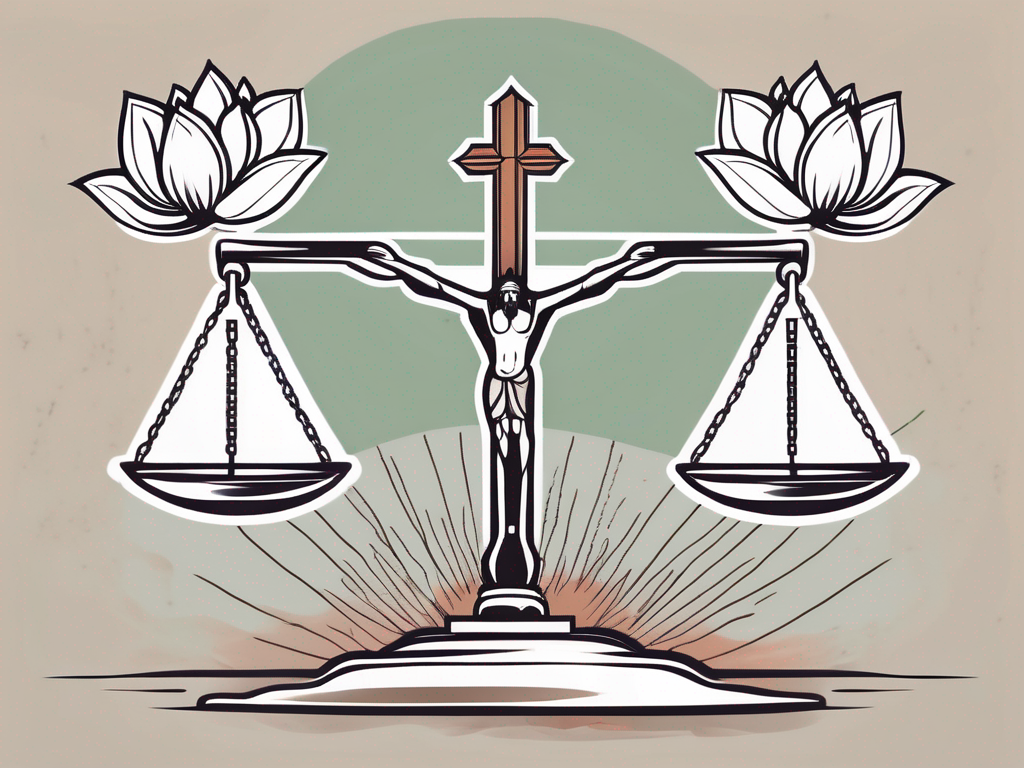In a world marked by diverse faiths and belief systems, Christianity and Hinduism stand out as two of the most prominent religions. Both possess rich historical backgrounds, unique theological perspectives, and distinct ethical teachings. This article aims to provide a comparative analysis of these two religions, shedding light on their core beliefs, historical context, theological differences, rituals, symbols, practices, and ethical teachings. Through exploring these aspects, we can gain a deeper understanding of the similarities and differences between Christianity and Hinduism.
Understanding the Basics of Christianity and Hinduism
To comprehend the dynamics of Christianity and Hinduism, it is essential to delve into their foundational principles and beliefs. Christianity encompasses a monotheistic framework, embracing the belief in one God who reveals Himself through the Holy Trinity of Father, Son (Jesus Christ), and the Holy Spirit. Furthermore, Christians regard Jesus Christ as the divine figure who sacrificed Himself for the salvation of humanity.
Hinduism, on the other hand, is a polytheistic religion that embraces a diverse collection of deities. It recognizes the concept of Brahman, a supreme cosmic force that interweaves all living beings, deities, and the universe. Hinduism also promotes the idea of reincarnation, where the soul transitions through multiple lifetimes based on karma, the law of cause and effect.
Christianity and Hinduism, despite their differences, share common threads in their pursuit of spiritual enlightenment and the search for meaning in life. Both religions offer pathways to connect with the divine and strive for a higher purpose.
Core Beliefs and Principles of Christianity
At the heart of Christianity lies the belief in the divinity of Jesus Christ, the savior of humanity. Christians follow a moral code guided by the Ten Commandments, which emphasize virtues such as love, honesty, and compassion. They also highly value the Bible, the holy scripture that contains the teachings and narratives central to their faith.
Christianity places a strong emphasis on the concept of grace, the unmerited favor bestowed upon believers by God. This grace is believed to be the means by which individuals can attain salvation and eternal life. Christians also engage in prayer, worship, and fellowship as essential components of their spiritual journey.
The Christian community is diverse, encompassing various denominations and traditions. Each denomination may have its own distinct practices and interpretations of scripture, but they all share the core belief in Jesus Christ as the Son of God and the path to salvation.
Core Beliefs and Principles of Hinduism
Hinduism encompasses a complex system of beliefs and rituals. Its core principles revolve around dharma, the duty that individuals must fulfill in alignment with their caste and stage of life. Hindus also strive for moksha, liberation from the cycle of birth and death, through spiritual practices and devotion to specific deities.
Hinduism recognizes the importance of karma, the consequences of one’s actions, and the impact they have on future lives. It encourages individuals to lead a righteous life and fulfill their responsibilities to attain positive karma. The practice of yoga, meditation, and self-discipline are integral to the Hindu spiritual journey.
Within Hinduism, there are various paths to moksha, including the path of knowledge (Jnana Yoga), the path of devotion (Bhakti Yoga), the path of selfless action (Karma Yoga), and the path of meditation and control of the mind (Raja Yoga). Each path offers a unique approach to spiritual growth and liberation.
Hinduism is rich in mythology and folklore, with a vast pantheon of gods and goddesses representing different aspects of the divine. These deities are worshipped through rituals, prayers, and offerings, allowing individuals to establish a personal connection with the divine.
It is important to note that Hinduism is not a monolithic religion but rather a diverse tapestry of beliefs and practices. It encompasses a wide range of traditions, rituals, and philosophies that vary across different regions and communities.
Historical Context and Evolution
The historical context of both religions plays a crucial role in understanding their development and spread. Christianity takes its roots from Judaism and emerged in the first century AD. It experienced significant growth after the rise of Jesus Christ, leading to its establishment as a major global faith.
On the other hand, Hinduism developed gradually over thousands of years and lacks a specific founder or single text. It assimilated various cultural influences and indigenous beliefs, rendering it a diverse and adaptable religion.
The Origins and Development of Christianity
Christianity traces its origins to the ancient Jewish traditions and the life and teachings of Jesus Christ. Jesus’ crucifixion and resurrection served as a pivotal event, significantly impacting the formation and spread of the Christian faith. The early Christian community faced persecution but gradually gained acceptance within the Roman Empire and beyond.
As Christianity spread, it encountered different cultures and incorporated elements from them. For example, when Christianity reached Europe, it blended with pagan traditions, resulting in the emergence of unique Christian practices and holidays. The conversion of Emperor Constantine to Christianity in the 4th century further solidified its position and led to the establishment of Christianity as the state religion of the Roman Empire.
Throughout history, Christianity has undergone various schisms and reforms, leading to the formation of different denominations and sects. The Protestant Reformation in the 16th century, spearheaded by figures like Martin Luther and John Calvin, challenged the authority of the Roman Catholic Church and gave rise to Protestantism. This division within Christianity continues to shape its diverse landscape today.
The Origins and Development of Hinduism
Hinduism’s development is more nuanced, as it amalgamates diverse cultural and religious practices indigenous to the Indian subcontinent. Ancient scriptures like the Vedas and Upanishads, along with the influence of various sages and teachers, contributed to the evolution of Hinduism over time. It evolved into a multifaceted religion encompassing various sects, rituals, and philosophical schools.
One of the significant aspects of Hinduism is its belief in reincarnation and karma. These concepts, rooted in the ancient texts, shaped the moral and ethical framework of the religion. Hinduism also embraces the idea of dharma, which refers to one’s duties and responsibilities in life based on their social position and stage of life.
Over the centuries, Hinduism absorbed and assimilated various cultural and religious practices, resulting in the emergence of different sects and traditions. The Bhakti movement in medieval India, for example, emphasized devotion and personal connection with the divine, leading to the rise of bhakti sects within Hinduism.
Furthermore, Hinduism’s association with yoga and meditation practices has gained significant attention in recent times. The ancient practice of yoga, which aims to unite the mind, body, and spirit, has become popular worldwide and is often associated with Hinduism.
Today, Hinduism continues to evolve and adapt to the changing world. It remains a vibrant and diverse religion, with followers spread across the globe, practicing various rituals, and engaging in philosophical debates.
Theological Differences and Similarities
While Christianity and Hinduism differ significantly in their theological frameworks, they also share some commonalities. In Christianity, the concept of God as a trinity stands in contrast to the diverse pantheon of Hindu deities.
Additionally, both religions offer differing perspectives on the afterlife and salvation. Christianity emphasizes the belief in an eternal afterlife, with salvation attained through faith in Jesus Christ. Hinduism, in contrast, highlights the cyclical nature of life and death, with salvation attained through the liberation of the soul from the cycle of reincarnation.
Concept of God in Christianity and Hinduism
Christianity firmly upholds the belief in one God who manifests as three distinct persons: the Father, the Son, and the Holy Spirit. This trinitarian concept encourages believers to establish a personal relationship with God.
On the other hand, Hinduism encompasses a diverse pantheon of deities, representing various aspects of the supreme cosmic force. This allows individuals to engage in devotional practices and connect with deities that resonate with their personal inclinations and needs.
Within Christianity, the concept of the trinity is a central tenet that shapes the understanding of God’s nature and relationship with humanity. The Father is seen as the creator and sustainer of the universe, while the Son, Jesus Christ, is believed to be the incarnation of God who came to Earth to redeem humanity. The Holy Spirit is seen as the divine presence that dwells within believers, guiding and empowering them.
In Hinduism, the pantheon of deities offers a rich tapestry of divine beings, each with their own unique attributes and roles. From Brahma, the creator, to Vishnu, the preserver, and Shiva, the destroyer, the deities in Hinduism represent the various aspects of the supreme cosmic force. This allows individuals to choose a deity that resonates with their personal inclinations and needs, fostering a sense of connection and devotion.
Afterlife and Salvation: Christian and Hindu Perspectives
Christianity teaches that eternal salvation is attainable through faith in Jesus Christ and acceptance of Him as the savior. Heaven, as a place of eternal joy and communion with God, awaits believers who uphold these principles.
Within Christian theology, the concept of salvation is intricately linked to the belief in Jesus Christ as the Son of God and the redeemer of humanity. Through His sacrificial death and resurrection, Christians believe that Jesus offers the path to eternal life and reconciliation with God. This belief in salvation through faith is a central aspect of Christian doctrine.
In contrast, Hinduism offers multiple paths to salvation, such as the pursuit of knowledge (jnana), devotion (bhakti), and selfless action (karma yoga). It aspires to achieve moksha, the end of the cycle of reincarnation, where the individual soul unites with the divine.
Within Hinduism, the concept of salvation is intricately tied to the idea of liberation from the cycle of birth, death, and rebirth. This cycle, known as samsara, is seen as a result of karma, the law of cause and effect. By engaging in spiritual practices and leading a virtuous life, Hindus seek to accumulate positive karma and ultimately attain moksha, where the individual soul merges with the divine and achieves liberation from the cycle of reincarnation.
It is important to note that while Christianity emphasizes the belief in a singular afterlife destination, Hinduism acknowledges a variety of possibilities. Depending on one’s actions and spiritual progress, Hinduism suggests the potential for different realms or states of existence after death, such as heaven, hell, or even rebirth in a new body.
Rituals, Symbols, and Practices
Rituals and practices play a crucial role in shaping the religious experiences of Christians and Hindus. Both religions possess distinct ceremonies and symbols that serve as outward expressions of their faith.
Christian Rituals and Their Significance
Christianity incorporates various sacraments, such as baptism and the Eucharist (Holy Communion). These sacraments enable believers to receive divine grace and express their commitment to the Christian faith. Additionally, symbols like the cross and the fish hold significant religious meaning and serve as reminders of key events and principles.
Hindu Rituals and Their Significance
Hinduism encompasses a myriad of rituals and practices, often varying among different sects and regions. From performing puja (worship) at home altars to participating in elaborate temple ceremonies, Hindus engage in actions aimed at expressing devotion and seeking spiritual blessings. Vibrant festivals and pilgrimage sites also hold immense significance in Hindu religious observances.
Ethical Teachings and Moral Codes
Both Christianity and Hinduism provide ethical frameworks and moral codes to guide their followers in leading righteous lives. These principles shape individuals’ actions, relationships, and interactions with the world around them.
Christian Ethics and Morality
Christian teachings emphasize the importance of love, forgiveness, compassion, and honesty. The Golden Rule, encapsulating the teaching to “love your neighbor as yourself,” serves as a guiding principle for Christians in their interactions with others.
Hindu Ethics and Morality
Hinduism promotes a moral code encapsulated within the concept of dharma. This code emphasizes duty, righteousness, and the pursuit of virtues such as compassion, honesty, and non-violence. Additionally, the teachings of karma highlight the connection between individual actions and their consequences.
A Journey of Discovery
Exploring the comparative analysis of Christianity and Hinduism allows us to appreciate the richness and diversity of religious thought and practice. While both religions differ significantly in their theological frameworks, rituals, and ethical teachings, they share common aspirations of attaining a deeper understanding of the divine and leading morally upright lives.
By recognizing the similarities and differences between these two influential faiths, we foster an environment of respect and dialogue, embracing the values of interfaith harmony and understanding in our increasingly interconnected world.












